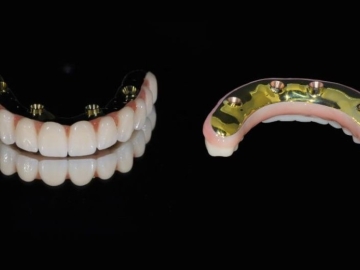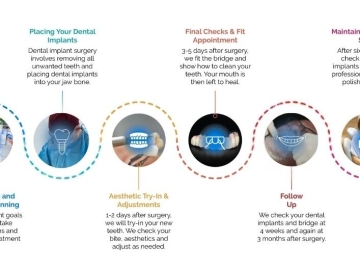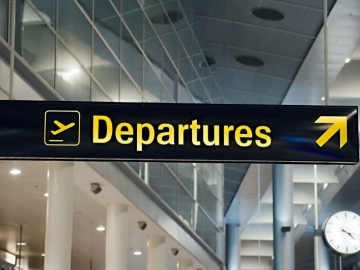
Posted on: 15 August, 2025
The right diet is vital for healing and adjusting to your new teeth
5 minute read
Replacing missing or severely damaged teeth with dental implants can help you enjoy a wide variety of nutritious foods again. However, before you sink your teeth into that juicy steak, it’s important to give your mouth time to heal and your new teeth time to adjust.
Eating well during your recovery from All-on-4® implant surgery means choosing a balanced diet rich in vitamins and minerals while avoiding excess pressure on your implants by sticking to liquid and soft foods in the first 8 to 12 weeks after surgery. Following your dentist’s dietary guidance can help minimise discomfort, reduce the risk of implant failure or other complications, and give your implants the best chance of long-term success.
Read this guide for tips on what to eat, what to avoid, recipe ideas, and other advice to support a smooth recovery. For personalised advice about All-on-4® implants and recovery, contact our friendly team at Mount Lawley Dental today.
.jpg)
Your All-on-4® bridge will usually be fitted within 1 to 3 days after your implant surgery. While you’re waiting, it’s important to stick to a healthy liquid diet and drink plenty of fluids to support healing.
Nutritious liquid options include:
For the first 24 hours, try to avoid very hot or very cold drinks (like tea, coffee, or iced beverages). Also steer clear of spicy or sticky foods, as well as alcohol, for the first three days.
Once your new teeth are fitted, you can begin enjoying soft foods as you gradually adjust.

Once your dentist has fitted your All-on-4® bridge, you’ll be able to start chewing food again. To protect your healing implants and give your mouth time to recover, it’s best to begin with soft foods.
A soft diet can still be varied and enjoyable — simply choose foods that are cooked until they’re tender and easy to chew, so you can eat comfortably without putting extra pressure on your implants.
There are many ways of preparing soft foods, including:
It can take between 3 and 6 months for the jaw to fully integrate with dental implants. Your dentist will check your progress during your 4-week, 3-month and 6-month follow-up appointments and advise when it’s the right time to introduce harder foods again. For more dental implant diet and nutrition tips, call our team on (08) 9227 8777.
.jpg)
To give your implants the best chance of success and help your mouth heal comfortably, your dentist will recommend avoiding:
It’s also important to avoid alcohol for the first 3 days after surgery and to avoid smoking altogether. Research shows that smoking after dental implant surgery increases the risk of implant failure and slows the healing process. Tobacco use can also raise the risk of other oral health problems in the future*.
* Mustapha AD, Salame Z, Chrcanovic BR. Smoking and Dental Implants: A Systematic Review and Meta-Analysis. Medicina (Kaunas). 2021 Dec 27;58(1):39. doi: 10.3390/medicina58010039. PMID: 35056347; PMCID: PMC8780868.
Eating a balanced diet with plenty of protein, healthy carbohydrates, and good fats can support your body’s healing after All-on-4® surgery and help your implants bond securely with your jawbone.* On the flip side, having too much fat or fructose in your diet may slow this bonding process.**
Protein plays a big role in your recovery. It helps your body produce collagen, which repairs bone and gum tissue, and it supports your immune system by making antibodies to fight off infection. You can boost your protein intake by:
Vitamin C is another key nutrient for healing and can help lower the risk of complications after surgery.*** Other important vitamins and minerals include vitamin A, vitamin D, calcium, copper, and zinc.
If you find it hard to get enough vitamin C or other essential nutrients through your diet, your dentist or doctor may recommend supplements to give your recovery an extra boost.
* Lau BY, Johnston BD, Fritz PC, Ward WE. Dietary strategies to optimize wound healing after periodontal and dental implant surgery: an evidence-based review. Open Dent J. 2013 Apr 5;7:36-46. doi: 10.2174/1874210601307010036. PMID: 23802022; PMCID: PMC3681034.
** King S, Baptiston Tanaka C, Ross D, et al. A diet high in fat and fructose adversely affects osseointegration of titanium implants in rats. Clin Exp Dent Res. 2020; 6: 107–116.
*** Li X, Tang L, Lin YF, Xie GF. Role of vitamin C in wound healing after dental implant surgery in patients treated with bone grafts and patients with chronic periodontitis. Clin Implant Dent Relat Res. 2018; 20: 793–798.
If you’re unsure about what to eat during your recovery, here are some meal ideas for soft foods that are packed with vitamins and minerals, healthy fats, protein, carbohydrates and dietary fibre.
.jpg)
.jpg)
.jpg)
.jpg)
.jpg)
.jpg)
.jpg)

If you choose to restore your smile with All-on-4® implants at Mount Lawley Dental, your dentist will guide you through every step so you know exactly what to expect during and after your surgery. It usually takes around 3–4 days for your final bridge (your new teeth) to be custom-made.

While you’re waiting, your implants will be protected with small healing caps. During this time, it’s important to stick to a liquid diet and avoid touching the healing caps. Once your bridge is ready, we’ll call you back in to have your new teeth fitted.
We recommend taking paracetamol 30 minutes before your fit appointment to help reduce any discomfort.
Here are some more tips to improve your chance of a smooth and swift recovery.
.jpg)
We recommend taking it easy for the first 3 days after your surgery and avoiding exercise for at least a week. Physical exertion and increased blood flow can sometimes cause swelling or bleeding – this can include movements like lifting and bending. It’s also a good idea to keep stress to a minimum, as it may increase discomfort and slow your recovery.
If you had your surgery under sedation, such as intravenous (IV) sedation or general anaesthesia, please arrange for a trusted friend or family member to take you home and stay with you for the next 12 hours. They can help keep an eye on your recovery while the sedation fully wears off.
.jpg)
It's normal to feel some pain and discomfort after your surgery when the anaesthesia or sedation wears off. Your dentist might recommend over-the-counter pain relief like paracetamol and ibuprofen or prescription medication to relieve pain, swelling and other symptoms.
Swelling usually peaks around 2 to 3 days after surgery and can gradually subside over 1 to 2 weeks. You can try safe home remedies like placing an ice pack against each side of your face for 10 to 20 minute intervals for the first 48 hour, drinking ice cold water can also help to reduce swelling.
The surgical sites may bleed occasionally in the first few days after surgery. If this happens, apply a clean and moist handkerchief or gauze and press down for 10–30 minutes or as long as it takes to stop the bleeding. You can try to prevent bleeding by sleeping with your head lifted and avoiding strenuous exercise.
If your mouth continues to bleed after a few days, or you have other unexpected symptoms, contact your dentist immediately to make an emergency appointment.
.jpg)
It’s important to keep your mouth clean but avoid vigorous rinsing in the days after your surgery. Your dentist will give you a gentle mouthwash that you should use for two weeks. After this time, you can continue gargling with warm salt water to help prevent infection.
After your bridge is fitted, you can keep it clean by brushing daily with a soft-bristled toothbrush and begin rinsing it with the water flosser provided to you around two weeks after your surgery. Your dentist’s advice may be different depending on the type of implants you have and whether you had other surgeries. A comprehensive post-operative guide for All-on-4® dental implants is provided to you by your dentist.
Once your new teeth are fitted, your dentist will arrange a follow-up visit after four weeks. This gives them the chance to check that you’re adjusting well and the implants are healing properly. It can sometimes take tome to get used to new teeth. If you have any concerns about your bite, contact the clinic at any time.
.jpg)
“Had my implant placed today – very efficient service! Would highly recommend the team for any dental treatment. 10/10.” – Brian Murphy
_1.jpg)
If you want to know more about what to expect with All-on-4® dental implants or to talk to a dentist about your teeth, call our team at Mount Lawley Dental on (08) 9227 8777 or book online. We’ll make sure you have all the information you need so you can decide what treatment is best for you. We welcome patients from all local areas, including Highgate and Inglewood.

How Long Do All-On-4® Dental Implants Last in Australia

From Consult to Smile: The All-on-4® Journey

Overseas All-on-4® Treatment vs Australia: Is It Safe?